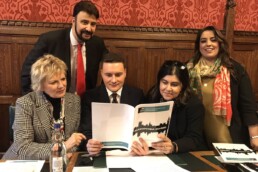A true believer is fundamentally one who engenders Abrahamic monotheism and aspires to the highest form of moral conduct reflected in the shari’ah, and given the complexities life tends to throw up believers occasionally find themselves seeking an understanding of the divine will to various issues. As times change and contexts will perpetually vary, this necessitates that there shall always be a need for judicious responses to queries of a religious nature, as well as those who have the learning to provide them. Regrettably, in some circles these solutions have become merely a matter of intellectual experimentation, and those who offer an inventive reason to divert from praiseworthy norms are celebrated as the truest of sages, heroes that shall defend the aspirations of the people. While orthodox scholars regard finding solutions stimulating challenges, they also remain cognisant of the fact that the aspirations of the people must be tempered by the idea of godliness. As God put it, “And if you obey most of those upon the earth, they will mislead you from the way of God.” (Q 6:116)
Many of those looking for these ‘solutions’ tend to demand them rather impatiently, expecting a tailor-made response without exerting any thought to what a solution actually is. The notion is worthy of consideration: an attempt to solve something is usually about dealing with a question that is often a matter of uncertainty, where we might seek an explanation for it. In the context of solutions pertaining to the Muslim community, guidance (irshad) or legal verdicts (fatwas) are also solutions in that they are responses that attempt to provide instructions to a particular issue – an application of what God the lawgiver has stipulated, accounting of course for various factors.
Whilst laymen demand panacea (a cure-all solution) from the get go, scholars tend to progress rather more methodically. This has been the established practice of those imbued with knowledge from ancient times: Moses was inspired to meet with a knowledgeable servant of God so that he may learn a thing or two. Rather than provide a three-point plan, Khidr offered him practical knowledge, and true to the habits of the untrained Moses failed to keep his side of the bargain to remain patient which resulted in the abrupt end of the very valuable schooling. The final Prophet put it wistfully, “God have mercy on my brother Moses, if he had been patient with Khidr we would have witnessed remarkable things!” (al-Bukhari)
For those who correctly initiate this methodical enterprise, every query is considered within the following framework: what does God want from us in the current situation given the factors at play? To answer this very pertinent question scholars are first required to astutely determine two very important components.
Firstly, in order to create a framework in which a specific issue might be viewed there should be an overall (bi’l-ijmal) idea on what God might want from us in the current context, keeping in mind the expectations of the Lawgiver for those in our situation, and how contextual variables shape an entire religious narrative. Secondly, scholars turn to the particular issue at hand, grasping the phenomenon in question, perceptive of the context, and then seeking to clarify the expectations of God.
[blockquote align=”none” author=”Abu Bakr b. al-Qayyim”] Neither the juris-consult (mufti) nor the judge shall be authorised except with recourse to two constituents: the first is an understanding of, and insight (fiqh) into, the situation; deriving knowledge of what has occurred in actuality by means of considering variables, markers, and indicators until he fully grasps the issue at hand. The second is an understanding what the situation makes incumbent, which is to understand the edict of God and His messenger that he decreed either in His book or by the tongue of His messenger in relation to a situation such as this; he is then to apply one to the other. Whoever exerts his efforts and expends his faculty on such an undertaking shall not lose a reward or two, for the scholar is one who arrives – with knowledge of the situation, and insight – at knowledge concerning the edict of God and His messenger…[/blockquote]
Clearly, to deduce the expectations of God scholars must be well versed in revelation and be able to offer rigorous systems of reasoning with which they interpret the divine address (khitab). Additionally there must be philosophical considerations very pertinent when applying the word of God in modernity, a divine word that was revealed over a thousand years ago to a very different world. For example, must a command always be realised in a specific manner or are commands simply manifestations of the overarching principles God so desires? Might it be one or the other depending on the situation, and if so, how do we determine which one in a given situation?
Another example might be the jurisprudential issues raised with the prophetic statement, “Pray as you see me praying.” Not every aspect of salah (prayer) has been conclusively reported so do we fill in the blanks or simply halt? If we fill in the blanks how do we determine what those blanks should be – do we deduce them by way of legal analogy (qiyas) or consider dubious narrations (da’if) we would have previously disregarded?
Resolving issues can be complex and invoke a plethora of considerations; in the context that people want the ultimate remedy to ‘our woes’, different people regards those woes to be different things. Many Muslims tend to have a single focus on foreign affairs, one’s religiosity being determined by levels of activism for Gaza and Syria or concern about foreign intervention in the Middle East. For others everything boils down to sexual ethics, often concentrated on sexual orientation and coverings. A few debate abstract ritual requirements often completely missing the point of religious ritualism or remain preoccupied with theological minutiae relevant to the 11th century rather than those that need to be addressed in modern times.
This culture of rudimentary thinking often requires people to view things in a binary fashion, which subsequently leads to the assumption that addressing complex issues might come down to three-point plans or four-step solutions. It is the result of a number of key factors such as the death of expertise, the assumption that everything is easy to understand by virtue of easy recourse to specialised information (via the internet and Google translate), and self-styled clerics who put everything down to the face value of a cherry-picked verse or hadith. We have seen the rise of a culture that values empty rhetoric and baseless assumptions whilst exhibiting a proclivity to view most things with a negative attitude.
Our progression of both thought and action lies in our ability to move beyond rudimentary conceptualisations onto analysing sophisticated phenomena in a way that is grounded in an interdisciplinary approach that combines Islamic and western disciplines underlain by an appreciation of historical processes, contemporary culture, and social doctrines. For example, the puerile idea that non-Muslim culture simply boils down to binge-drinking and lewdness is daft, many non-Muslims are in meaningful and committed relationships and as for alcohol, not only is the number of teetotalers rising, but many Muslims mistaken drinking to be an act of the intrinsically depraved; for millennia strong drink has been at the centre of socialising. al-Bukhari and Muslim narrate by way of Anas b. Malik that he would serve alcoholic beverages to Abu Talha and others who would socialize over a drink before the prohibition was revealed. To view this as indicative of inherent evil or absolute decadence that the British shall never change (an argument presented by insular Muslims to account for the dismal progress they make in proselytizing to the white population) conveniently ignores the gradual and positive changes the shari’ah brought to entrenched ancient Middle Eastern customs.
Another simplistic idea is the narrative that the west hates ‘us’, and that the entire British government (politicians and civil service included) is out to undermine Muslims due to their belief in the One God and prophethood of Muhammad. As obvious as it might be, many overlook the fact that the government is made up of various types of people, neo-conservatives and socialists, hawks and doves, people interested in developing social welfare and others interested in equal rights amongst diverse citizens. The interests of those in power aren’t simply based on ideological beliefs but also wealth and privilege; class structures, ideas on race and ‘special relationships’ also affect decision-making at the top. Perhaps a good example related to the media might be the recent expose by Peter Oborne, the former chief political commentator of the Telegraph who informs us that it chose not to run a story he covered on HSBC’s closure of bank accounts belonging to high profile Muslims. The silence of the newspaper wasn’t due to the faith of the account holders or Islam in general, but simply down to lucrative advertising contracts the Telegraph had with HSBC.
In order to understand the numerous complexities one is required to have an insight into political ideologies and class-based social doctrines as well as the way they subsequently manifest on the ground. A lack of understanding about the complex nature of politics, the plethora of variables that affect the processes of policy making, as well as a separate analytical study of Islamic political theory, how it is shaped by theology and how it might sit (and develop) in the philosophical framework of western modernity has meant that naïve and simplistic understandings have become widespread.
In the realm of religion, undeveloped ideas on theology and law have meant that people approach everything through the crude paradigm of being pillars (arkan), conditions (shurut), and impediments (mawani’). Many have come to view a phenomenon as being either permissible or not, failing to understand the nature of the phenomenon under discussion. For example, the obligation of appointing a caliph met with scholastic consensus (ijma’), but was it a consensus on having a token leader we call a caliph, or rather, a civilised community that mandates a sovereign as a representative of a believing people to reflect their intuitions, work in their interests, maintain impartial justice, establish a highly ethical rule of law, and strengthen virtue, all regardless of what we call such a leader? To think in this way necessitates that the undertaking is one where we understand the expectations of God, the philosophy of His law, the epistemic values we engender, the balancing act of deciphering the public good and deducing legal and moral codes all the while wrestling to maintain the boundaries of orthodoxy.
The problem with providing panacea is that any plan to progress and mature in our complex setting is bound to sit on a number of premises and hermeneutic reflections, all of which evolves out of a certain way of looking at Muslims in the west. A failure to understand a thinker’s starting point will inevitably hinder an accurate understanding of the proposed strategy and an appreciation of the way in which it resolves issues.
Any narrative that a scholar may formulate that includes a starting point from which Muslims might contextualise Islam in the west is bound to be complex not least because it’s a philosophy on everything as deduced from revelation, ethics, the prophetic life and the world around us today. To appraise this requires a baseline of knowledge most people are not to be privy to and frankly care little for. Given the complexity and sustained effort required for such a serious undertaking, people refuse to do things meaningfully and instead buy into simplistic narratives upon which any robust solution can never sit, and in their bellicosity – this primitive conduct concomitant with their simplistic thinking – they troll those who see no utility in simplifying matters as they do. They absurdly view those who seek to manifest timeless theology or infuse a godly approach into modern matters as traitors and sellouts, as if the Most High revealed His will only for the Middle ages with the intent that the world would remain that way until the end of days. But clearly He did not, and those who truly love God and His messenger seek to reflect revelation wherever they are in a way that actually effectuates godliness amongst all, instead of congregating amongst themselves and fantasising over a highly embellished past.
It is obvious that the maturation of western Muslims has not quite reached the stage where they might answer complex questions as a community, not only because of simplistic thinking amongst many groups but also due to the inability of many to comprehend what it means to be godly in western modernity. But rather than sit by idly, we in the middle must, in the least, initiate the process that leads to the situation where we are able to meaningfully engage with complex solutions that progress the faith and where believers serve as helpers to the cause of God. To begin we must look inwards and ask ourselves: why are we even having this discussion? Once we determine why the entire undertaking is important and what it is that God wants (based on what He has told us), we won’t have a community running from one suggestion to the next as has been the case for some time but a band of resolute, civilised and confident believers who effectively project the moral values of the shari’ah and recognise valid and righteous objectives working intelligently to achieve them.




